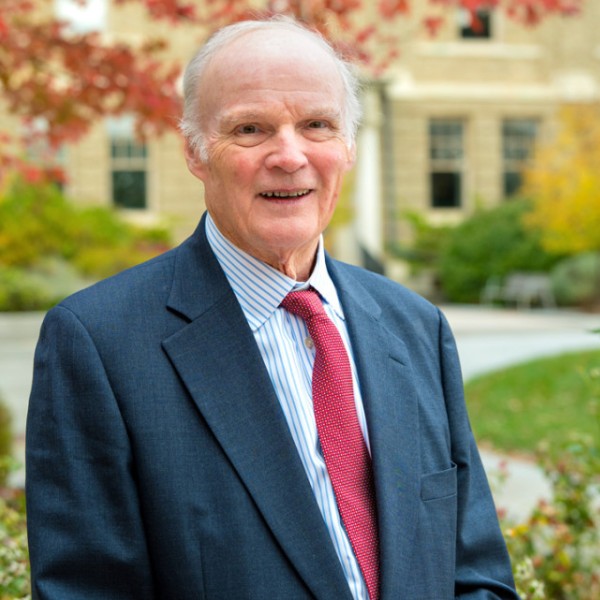Benjamin Houlton
Ronald P. Lynch Dean, Office of the Dean
Professor, Ecology and Evolutionary Biology
Professor, Global Development Section

Benjamin Z. Houlton is the Ronald P. Lynch Dean of the College of Agriculture and Life Sciences and a Cornell University professor in the Departments of Ecology and Evolutionary Biology and of Global Development. Ben began his tenure as the 12th Cornell CALS dean on Oct. 1, 2020, and was reappointed to a second five-year term in 2024. In addition, Ben serves as co-chair of The 2030 Project: A Cornell Climate Initiative, mobilizing practical climate change solutions for a more resilient society through collaborative work across disciplines universitywide. As dean, he shares responsibility for leadership of Cornell Cooperative Extension throughout New York state with the College of Human Ecology.
As a premier institution of scientific learning and discovery, Cornell CALS is a world leader in tackling the complex challenges of our time with a culture of interdisciplinary understanding and collaboration. CALS is home to Cornell University’s second-largest total college population, with 3,600 undergraduate students, 1,020 affiliated graduate students, more than 600 faculty members and 1,000 staff members. The college offers 20+ majors and 40+ minors, and comprises 16 academic departments and two schools. In fiscal year 2024, CALS led Cornell’s Ithaca campus in research expenditures with a total of $291.6 million.
As the cornerstone of Cornell’s Land Grant mission, CALS operates campuses in Ithaca and Geneva (Cornell AgriTech), including 498 facilities, and it oversees over 13,000 acres of experimental farms and forests throughout New York state. In partnership with the College of Human Ecology, CALS manages Cornell Cooperative Extension, with personnel stationed in every county in the state and in all boroughs of New York City. Globally, CALS partners with universities, governments, nongovernmental organizations and the private sector in 61 countries on projects that support the health and well-being of people and the planet.
Under Ben’s leadership, CALS launched a new strategic vision, “The Roadmap to 2050,” in 2022. This plan emphasizes the role of universities in supporting societal needs and prioritizes “moonshot thinking” in the form of team-based science in critical challenge areas. Also under Ben’s leadership, the college has revamped the curriculum with a new set of distribution requirements focused on hands-on learning beginning in 2025.
Ben is an accomplished international scientist, and his research interests include global ecosystem processes, climate adaptation solutions and agricultural sustainability. He has published more than 150 works, including book chapters, abstracts and peer-reviewed articles in such leading scientific journals as Nature, Science, Nature Climate Change and the Proceedings of the National Academy of Sciences. His work has been covered by news media including The New York Times, Scientific American, NPR, The Christian Science Monitor, Discovery News, MSNBC/Today and the BBC. As part of his mission to connect scientific discovery with the public, Ben is also a frequent guest on national and regional news programs.
Ben is co-founder of The N3gative Company (pronounced Negative), which empowers farmers and land managers with the tools to create, verify and exchange permanent carbon dioxide removal in soil. The company’s approach will scale up permanent carbon dioxide removal in soils around the world to remove millions to billions of tons of carbon dioxide each year while also improving agricultural productivity. He is also the founding principal investigator for the Working Lands Innovation Center, where he directs approximately 100 acres of farmland carbon sequestration projects to improve crop yields and create new financial markets for farmers and ranchers. He is a member of the Boyce Thompson Institute’s board of directors, serves on the eCornell and External Education advisory boards and on the SUNY Cannabis Taskforce, and he is a Cornell-appointed director for the Friends of the Cornell Lab of Ornithology. Ben is also the editor of Global Biogeochemical Cycles published by the American Geophysical Union, the world’s largest society promoting geophysical endeavors of Earth and space scientists.
Ben is an appointed director of the State University of New York Research Foundation (RF), the largest comprehensive university-connected research foundation in the country. The RF provides essential administrative services that enable State University of New York (SUNY) faculty members to focus their efforts on educating students and performing life-changing research across a wide range of disciplines, including artificial intelligence, clean energy, biotechnology, longevity, substance addiction, next-gen quantum computing, environmental health and resiliency. The RF works with the academic and business leadership of SUNY campuses to facilitate research and discovery by administering sponsored projects and delivering intellectual property and technology transfer services that fuel innovation and move ideas and inventions to the marketplace.
Prior to joining Cornell, Ben had served on the UC Davis faculty since 2007, teaching global environmental studies with a co-appointment in the UC Agricultural Experiment Station. He also led its John Muir Institute of the Environment, bringing together more than 300 faculty affiliates, 350 postdoctoral researchers, staff and students from across the university with the goal of devising innovative solutions to address the environmental sustainability challenges of the 21st century. As part of the Institute, he led the OneClimate “Big Idea,” an interdisciplinary, team-based approach to reduce greenhouse gas emissions and help people, ecosystems and agriculture adapt to an uncertain climate future. He also worked with California tribes to empower the application of Indigenous knowledge in agricultural and environmental sustainability. He has served as a scientific adviser to a Rockefeller Foundation and World Wildlife Fund project on sustainable agriculture, human nutrition and climate solutions.
Ben received his B.S. from the University of Wisconsin – Stevens Point in water chemistry, an M.S. from Syracuse University in environmental engineering science and a Ph.D. from Princeton University in ecology and evolutionary biology. He spent two years working as a postdoctoral scholar at Stanford University and its Carnegie Institution for Science before joining the UC Davis faculty. Ben is the recipient of the Gene E. Likens Award from the Ecological Society of America, the Andrew W. Mellon Foundation Young Investigator Award and the NSF-CAREER award.
Ben grew up in Wisconsin and Minnesota, solidifying his dedication to the environment at a young age while camping with his family throughout the Midwest and spending time on his great aunt and uncle’s dairy farm. His family legacy in agriculture spans the dairy, poultry and grain commodities, and still includes one remaining family dairy farm in Kansas. In his spare time, Ben can be found fly-fishing, running, traveling internationally and coaching wrestling.
Education
- B.S., University of Wisconsin – Stevens Point, College of Natural Resources (Water Chemistry, Chemistry Minor)
- M.S., Syracuse University (Environmental Engineering Science)
- Ph.D., Princeton University (Ecology and Evolutionary Biology)
Interests
Global ecosystem processes
Climate change solutions
Agricultural sustainability
Awards & Honors
- NSF-CAREER Award Recipient (2012 – 2017) “…the most prestigious awards in support of junior faculty who exemplify the role of teacher-scholar through outstanding research, excellent teaching and the integration of education and research within the context of the mission of their organizations.”
- Gene E. Likens Award (ESA) for the most outstanding paper published in the Biogeosciences (for Houlton et al., PNAS, 2006) (2007)
Selected Publications
- Peng, J., Wang, Y. P., Houlton, B. Z., Dan, L., Pak, B., & Tang, X. Global carbon sequestration is highly sensitive to model-based formulations of nitrogen fixation. Global Biogeochemical Cycles, 34(1), e2019GB006296 (2020).
- Khalsa, S. D. S., Smart, D. R., Muhammad, S., Armstrong, C. M., Sanden, B. L., Houlton, B. Z., & Brown, P. H. Intensive fertilizer use increases orchard N cycling and lowers net global warming potential. Science of The Total Environment, 137889 (2020).
- Xu, P., Chen, A., Houlton, B. Z., Zeng, Z., Wei, S., Zhao, C., et al. Spatial variation of reactive nitrogen emissions from China's croplands codetermined by regional urbanization and its feedback to global climate change. Geophysical Research Letters, 47, e2019GL086551 (2020).
- Houlton, B. Z., Almaraz, M., Aneja, V.,Austin, A. T., Bai, E., Cassman, K. G.et al. A world of cobenefits: Solving the global nitrogen challenge. Earth's Future,7, 865-872 (2019).
- Houlton, B. Z., Morford, S. L., Dahlgren, R. A., Convergent evidence for widespread rock nitrogen sources in Earth’s surface environment. Science (Research Article) Vol. 360, Issue 6384, 58-62 (2018).
- Lennon, E., Houlton B. Z., Coupled molecular and isotopic evidence for denitrifier controls over terrestrial nitrogen availability. Nature-ISMEJ (2017).
- Houlton, B. Z., Marklein A. R., and Bai E. Representation of nitrogen in climate change forecasts Nature Climate Change 5 (5): 398-401 (2015).
- Morford, S, Houlton, B. Z., and Dahlgren, R. A., Increased forest nitrogen and carbon storage from nitrogen-rich bedrock. Nature 477, 78-81 (2011).
- Houlton, B. Z., and Bai, E., Imprint of denitrifying bacteria on the global terrestrial biosphere. Proceedings of the National Academy of Sciences of the United States of America (PNAS) 106 (51): 21713 - 21716 (2009).
- Wang, Y. P., and Houlton, B. Z., Estimates of global nitrogen fixation: Implications for global climate change. Geophysical Research Letters 36: L24403 (2009).
- Houlton, B. Z., Wang, Y. P., Vitousek, P. M., and Field, C. B., A unifying framework for dinitrogen fixation in the terrestrial biosphere. Nature 454 (7202): 327-U34 (2008).
- Houlton, B. Z., Sigman, D. M., Schuur, E. A., and Hedin, L. O., A climate-driven switch in plant nitrogen acquisition within tropical forest communities. Proceedings of the National Academy of Sciences of the United States of America (PNAS) 104 (21): 8902 - 8906 (2007).
- Houlton, B. Z., Sigman, D. M., and Hedin, L. O., Isotopic evidence for large gaseous nitrogen losses from tropical rainforests. Proceedings of the National Academy of Sciences of the United States of America (PNAS) 103 (23): 8745-8750 (2006).
Contact Information
215 Garden Avenue
Roberts Hall Room 260
Ithaca, NY 14853
bzhoulton [at] cornell.edu
-
Additional links
Benjamin in the news

News
One of the most recent technologies for sequestering carbon, enhanced rock weathering could remove up to a gigaton of carbon by 2100 if adopted globally.
- Ashley School of Global Development and the Environment
- Global Development Section
- Climate Change

News
The Department of Global Development and the Department of Natural Resources and the Environment have been combined to establish a new school: the Cornell CALS Ashley School of Global Development and the Environment.
- Ashley School of Global Development and the Environment
- Global Development Section
- Natural Resources and the Environment Section

